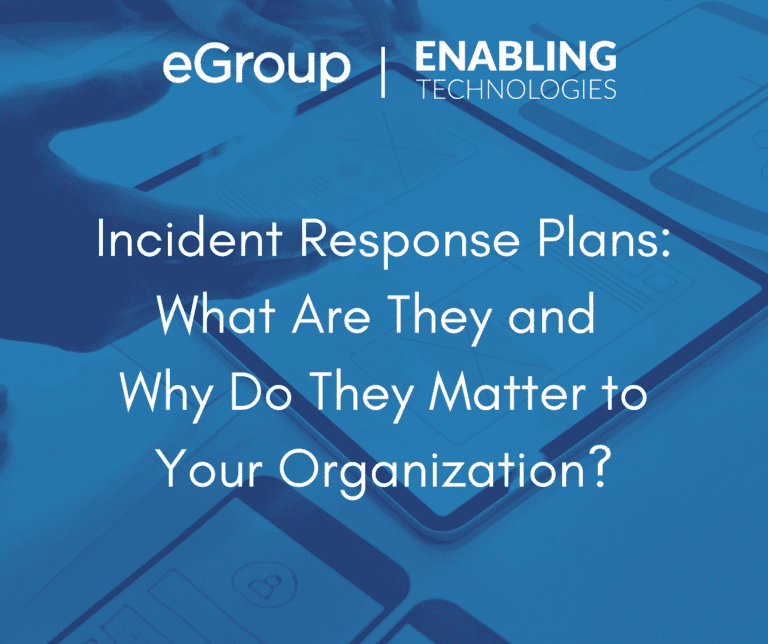Incident Response Plans: What Are They and
Why Do They Matter to Your Organization?


Jenn Johnson
eGroup Enabling Technologies
Consider These Facts
Human error accounts for a whopping 95% of cybersecurity breaches—and contrary to common belief, cybercriminals and hackers tend to exploit vulnerabilities outside of the IT department, capitalizing on the weakest links within your company.
A mere 38% of organizations worldwide assert that they are ready and prepared to tackle sophisticated cyberattacks, while about 54% report experiencing one or more attacks within the past 12 months.
While the staggering statistics above are disheartening, organizations can be prepared for the worst-case scenario to protect their digital assets in the event of a cyber attack by implementing an Incident Response Plan.
What’s an Incident Response Plan?
An Incident Response Plan (IRP) is a structured approach designed to handle and manage the aftermath of a security breach or cyberattack. The goal of an IRP is to identify, respond to, and recover from incidents in a way that limits damage, reduces recovery time and costs, and mitigates future risks.
What are Incident Response Plan Tabletop Exercises?
Every IT organization should have an incident response plan. It is intended as a guide for IT staff to use in the event that the organization suffers any disaster described in the plan.
Putting it plainly, tabletop exercises are a test of your organization’s response to real-world threat scenarios to find out if your organization is adequately prepared. Putting your plan to the test.
Tabletop exercises include a test run to find out whether your incident response plan sufficiently addresses likely threats to business continuity with the goal being to increase the team’s ability to detect, mitigate, and recover from cyberattacks effectively, thereby improving the overall cybersecurity posture and resilience.
By understanding how to respond to such incidents, you can mitigate their impact, empowering your organization to develop proactive strategies that minimize risks and prevent future occurrences, thereby safeguarding your digital assets.
Are Incident Response Plan Tabletop Exercises Worth the Cost?
Calculating the Return on Investment (ROI) of incident response plan tabletop exercises involves assessing the cost of the exercise and time investment of the team against the potential benefits and cost savings that result from improved incident response capabilities. Improved response capabilities contribute to overall risk reduction and business continuity, helping your organization avoid costly disruptions and maintain operations during security incidents. It’s important to assess the value of risk mitigation and business resilience in relation to the costs of potential disruptions. The potential benefits aren’t always immediately recognized because they are preventative measures being taken to achieve most of these benefits.
Who Should be Involved in Incident Response Plan Tabletop Exercises?
Incident response plan tabletop exercises typically involve professionals from various job roles to ensure comprehensive coverage of incident detection, analysis, and response. Some key job roles that should be involved include: Cybersecurity Analysts, Incident Response Coordinators, Digital Forensic Analysts, Network Security Engineers, Security Operations Center (SOC) Analysts, IT Administrators, Legal and Compliance Experts, Communication and PR Specialists, Operational Staff, and Executive Leadership.
By involving professionals from diverse job roles within your organization, these exercises ensure comprehensive coverage of all critical aspects, including identifying potential threats, understanding their impact on the business from various perspectives, and coordinating an effective, unified response. This holistic approach ultimately strengthens your organization’s security posture and positions your team for an effective response effort.
When is the Best Time to Conduct an Incident Response Tabletop Exercise?
Yesterday! It’s crucial to proactively train employees on incident response procedures before a security incident occurs. By conducting tabletop exercises in advance, your organization can better prepare your team to prevent, understand, and respond to incidents effectively, reducing the impact of potential breaches or prolonged repercussions.
It’s also common to incorporate incident response plan tabletop exercises into annual training or onboarding, before implementing new technologies or applications, or after security incidents and breaches.
Ultimately, the best time to conduct an incident response plan tabletop exercise is when it aligns with your organization’s strategic objectives, operational priorities, and compliance obligations. Regularly scheduled tabletop exercises not only help ensure that employees are adequately prepared to respond to cybersecurity incidents effectively, but can also help you meet your cyber insurance requirements.
What’s the Next Step?
Choosing the right provider to conduct an incident response plan tabletop exercise for your business is crucial to ensuring its effectiveness and relevance to your organization’s needs. With over 30 years of experience, eGroup Enabling Technologies’ team of security experts can help you put your incident response plan to the test. Gain visibility into real-world threat scenarios, along with clarity into best practices to strengthen your threat response and security posture for the long term.
We Can Help!
Interested in testing your team’s Incident Response Plan? Schedule an Incident Response Tabletop Exercise with our experts by reaching out to our team at info@eGroup-us.com or completing the form below.
"Working with eGroup Enabling Technologies on developing tabletop exercises for our top threats was an integral part of upgrading our information security risk management plan. It was a great experience and helped us identify and fill critical gaps in our own internal procedures. These documented exercises are serving as a training tool for all IT staff as well."
—Erica Feldkamp, VP of Information Technology and Security at Internews Tweet
Need Assistance With Your Incident Response Plan?
Contact our team today to schedule a call with one of our experts.

